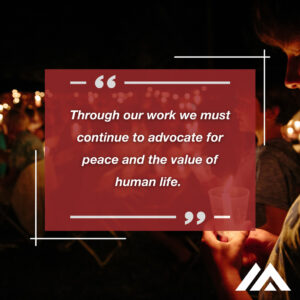 Over the last two weeks, our nation has suffered immense loss. On May 11 a shooting occurred at a hair salon in Dallas, Texas’ Koreatown, and on May 15 a gunman open fired on a Taiwanese church in Laguna Woods, California. These two hate crimes happened in the middle of Asian American and Pacific Islander Heritage Month, but instead of celebrating these communities are now in mourning. On May 14 another mass shooting occurred this time targeting the Black community at a Buffalo, New York supermarket, and just yesterday (May 24) a group of elementary school students lost their lives to gun violence in Uvalde, Texas.
Over the last two weeks, our nation has suffered immense loss. On May 11 a shooting occurred at a hair salon in Dallas, Texas’ Koreatown, and on May 15 a gunman open fired on a Taiwanese church in Laguna Woods, California. These two hate crimes happened in the middle of Asian American and Pacific Islander Heritage Month, but instead of celebrating these communities are now in mourning. On May 14 another mass shooting occurred this time targeting the Black community at a Buffalo, New York supermarket, and just yesterday (May 24) a group of elementary school students lost their lives to gun violence in Uvalde, Texas.
All of this, and more, comes just six months after our local community witnessed a deadly shooting at Oxford High School. Witnessing these acts of violence can cause feelings of anxiety, distress, and despair in children and adults. Below is a list of resources for coping with violence if you or a client are struggling, or trying to help a child process their own emotions.
Coping with Violence for Children – For children, a constant influx of violent news can make the world feel like a scary place, especially when these incidents occur at school. Children may express that they don’t feel safe and/or don’t want to go to school. It’s important that adults in their lives are able to balance validating their feelings while also reassuring them that it’s unlikely they’ll experience these types of events.
- Talking to Kids About Fear and Violence– Mental Health America
- Talking to Children About Violence: Tips for Parent and Teachers – National Association of School Psychologists
- School Shooting Resources – The National Child Traumatic Stress Network
- This toolkit features guidelines for parents, descriptions of age-related reactions, e-learning courses, and more.
- Resource Library on Guns and Violence – American Academy of Child and Adolescent Psychiatry
- Included in this library are fact sheets, clinical resources, links to advocacy opportunities, etc.
- How to Talk with Kids About Gun Violence – Psychology Today
Coping with Violence for Teens – Despite sharing many similarities with how you might guide a younger child through coping with violence, teens are capable of engaging with incidents of mass violence at a deeper level. While you should still provide reassurance to teens, you may find that they’re beginning to want to take action on their own. This may include independent consumption of media related to the events, advocacy work, and sharing their opinions on issues surrounding the incidences such as gun control.
- Federal Resources for Helping Youth Cope after a School Shooting – Youth.Gov
- Featured on this list is how to get involved with Youth Engaged for Changed, active shooter training, and other resources for older children and teens who may want to take a more active role in ensuring their own safety.
- How to Have the Conversation – 1800Respect
- While this website focuses on all types of violence, not just gun violence, it provides great insight into how to open the door for a conversation with a teen. These insights are especially applicable, since teens may experience gun violence at the hands of a peer.
- How to Talk with Kids About Gun Violence – Psychology Today
- Section on Teenagers and young adults
Coping with Violence for Adults – While adults may be more familiar with handling news of violent events, they are certainty not numb to the tragedy that these events bring. It’s important for adults to continue to honor their emotions and take care of their own well-being. This is key to continue believing that a solution is possible instead of simply giving up and viewing the situation as hopeless.
- Coping in the Aftermath of a Shooting – American Counseling Association
- Managing your Distress in the Aftermath of a Shooting – American Psychological Association
- Coping with Reactions to School Shootings – Vanderbilt
Coping with Racially Motivated Violence – When acts of violence take place against a group of people based on their race or ethnicity, many are left to cope not only with the act of violence itself but the trauma of the reasoning as well. Whether or not we are a part of an effected group it’s important to recognize that these acts are part of a larger issue and to work to be anti-racist. While the resources here are meant specifically to help individuals cope with racially motivated violence, we encourage you to check out our Anti-Racism & Equity resources as well.
- How to Recognize and Cope with Racial Trauma – Healthline
- Coping with Racial Trauma, Discrimination, and Biases – Drexel
- Managing your Distress in the Aftermath of Racial Trauma and Stress – American Psychological Association
As we mourn the victims of these tragic events we must also work to champion change. As President Brown stated in an email to our community, “Through our work we must continue to advocate for peace and the value of human life. Our chosen work is hard, but it’s what we have trained for and its work that we must do.”